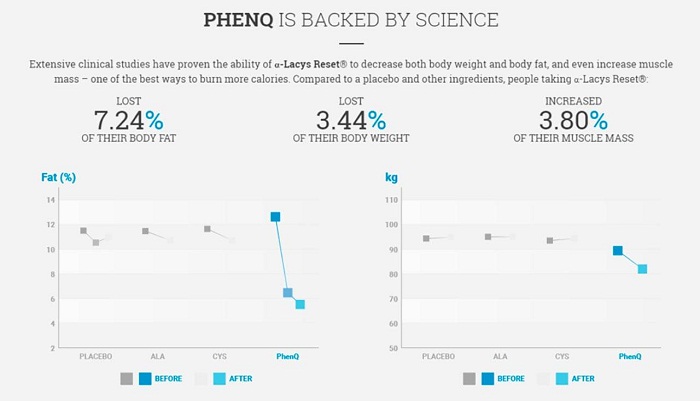Phentermine Side Effects
Contents
As individuals embark on their weight loss journey, the exploration of effective tools often leads them to consider medications such as Phentermine. Known for its powerful appetite-suppressing properties, Phentermine has gained recognition as a prescription medication for weight management. However, the benefits of Phentermine come hand-in-hand with potential side effects. This guide not only delves into the detailed analysis of Phentermine side effects but also provides a broader understanding of the medication itself, empowering users with comprehensive knowledge to make informed decisions about their health.
Related Article: PhenQ vs Phentermine | A Comprehensive Analysis of Two Weight Loss Solutions
Phentermine Overview

Phentermine belongs to a class of drugs known as sympathomimetic amines. It works as a central nervous system stimulant, specifically targeting neurotransmitters in the brain to reduce appetite. Phentermine is typically prescribed for short-term use, as its effectiveness tends to diminish over time. When combined with a well-balanced diet and regular exercise, Phentermine can assist individuals in achieving their weight loss goals.
Mechanism of Action:
Phentermine primarily functions by increasing the release of neurotransmitters such as norepinephrine, serotonin, and dopamine. These neurotransmitters work in the brain to suppress appetite and create a feeling of fullness, helping individuals consume fewer calories.
Prescription and Dosage:
Phentermine is a prescription-only medication, meaning it should only be taken under the guidance and supervision of a healthcare professional. The typical dosage varies based on individual factors, including weight, overall health, and the specific formulation of Phentermine prescribed. It is crucial to follow the prescribed dosage and guidelines to maximize benefits while minimizing potential risks.
Short-Term Use:
Phentermine is generally prescribed for short-term use, typically ranging from a few weeks to a few months. Prolonged use can lead to a decrease in its effectiveness and an increased risk of side effects. Healthcare providers carefully assess the duration of treatment based on individual needs and monitor patients closely during Phentermine use.
Lifestyle Modifications:
Phentermine is most effective when combined with lifestyle modifications. A well-balanced diet that is rich in nutrients, coupled with regular physical activity, enhances the weight loss potential of Phentermine. Healthcare providers often work with individuals to develop personalized plans that integrate medication with sustainable lifestyle changes.
In-Depth Analysis of Phentermine Side Effects

- Dry Mouth:
Phentermine’s impact on saliva production can lead to dry mouth. While this is generally manageable, individuals are advised to maintain hydration, possibly incorporating sugar-free gum or lozenges to stimulate saliva production and alleviate discomfort. Regular oral hygiene practices also contribute to minimizing this side effect.
- Dizziness:
The occurrence of dizziness, particularly in the initial stages of Phentermine use, necessitates caution during sudden movements. If persistent, consultation with a healthcare professional is vital for potential adjustments and guidance. Factors such as changes in blood pressure or individual tolerance levels may be considered.
- Constipation:
Phentermine-induced constipation underscores the importance of fiber-rich diets, adequate fluid intake, and regular physical activity. A comprehensive approach to digestive health, encompassing dietary adjustments and lifestyle changes, can effectively manage this common side effect.
- Fast Heart Rate:
Phentermine’s stimulant properties can lead to an increased heart rate. Regular monitoring is crucial, especially for those with pre-existing cardiovascular conditions. Any significant changes should prompt immediate consultation with a healthcare professional, highlighting the importance of cardiovascular assessments before and during Phentermine use.
- Chest Discomfort:
Though rare, chest discomfort is a potentially severe side effect requiring urgent medical attention. Comprehensive cardiovascular assessments before and during Phentermine use are essential, ensuring that any signs of distress are addressed promptly.
- Insomnia:
Difficulty falling or staying asleep is a common side effect of Phentermine. Establishing a consistent sleep routine and practicing relaxation techniques are beneficial strategies. Persistent insomnia warrants consultation with a healthcare professional for a thorough evaluation and potential adjustments to the treatment plan.
- Headache:
Headaches, often experienced initially, can be multifactorial. Hydration, stress reduction techniques, and over-the-counter pain relievers may provide relief. However, persistent or severe headaches necessitate reporting to a healthcare provider for a comprehensive evaluation.
- Hives:
Allergic reactions may manifest as hives, itching, or rash. Immediate medical attention is crucial, emphasizing the need for users to recognize signs of an allergic reaction and seek appropriate care. This underscores the importance of thorough allergy assessments before Phentermine initiation.
- Swelling in Your Ankles or Feet:
Edema, though less common, is a potentially serious side effect that requires consultation with a healthcare provider. Understanding the underlying causes and addressing them collaboratively contribute to maintaining overall health during Phentermine use.
- Tremor:
Mild tremors, while generally manageable, should be reported to a healthcare professional for further assessment. Identifying potential contributing factors, such as dosage adjustments or underlying health conditions, ensures a balanced and effective Phentermine experience.
- Trouble Breathing:
Difficulty breathing is a severe side effect requiring immediate medical attention. Regular respiratory assessments and swift action in response to any breathing difficulties are imperative, underlining the importance of comprehensive respiratory evaluations before and during Phentermine use.
- High Blood Pressure:
Phentermine’s potential to elevate blood pressure necessitates regular monitoring, especially for individuals with pre-existing hypertension. Collaboration with healthcare providers for a comprehensive plan for monitoring and managing blood pressure contributes to user safety during Phentermine use.
- Decreased Interest in Sexual Intercourse:
Changes in libido may occur while taking Phentermine. Open communication with a healthcare provider is crucial for addressing concerns related to sexual health, and potentially considering adjustments to medication or additional support. Acknowledging the potential impact on sexual health and discussing concerns contribute to a holistic approach to well-being.
- Heart Palpitations:
Monitoring and reporting heart palpitations to a healthcare provider are essential for appropriate evaluation and management. Understanding potential causes and addressing them collaboratively contribute to a more comfortable experience with Phentermine.
- Restlessness:
Feelings of restlessness or agitation may be experienced by some individuals using Phentermine. Engaging in calming activities, practicing mindfulness, and discussing these feelings with a healthcare professional can help manage this side effect. Recognizing the impact of restlessness on overall well-being and working collaboratively with healthcare providers to address contributing factors contribute to a positive Phentermine experience.
- Unusual Behavior:
Rarely, Phentermine may cause changes in behavior. Users and their loved ones should be vigilant for any unusual or concerning behaviors and seek medical advice promptly for a thorough evaluation. Recognizing the potential for behavioral changes and addressing them promptly with healthcare providers is crucial for maintaining overall well-being during Phentermine use.
- Unpleasant Taste:
A less common side effect, an unpleasant taste in the mouth, may occur. While generally mild, persistent taste disturbances should be reported to a healthcare provider for further assessment. Understanding the potential causes of taste disturbances and addressing them collaboratively with healthcare providers contribute to a more comfortable experience with Phentermine.
- Weakness:
Weakness or lack of energy may be experienced while taking Phentermine. Adequate rest, proper nutrition, and regular exercise contribute to managing this side effect. If weakness persists, consulting a healthcare professional is advisable. Recognizing the impact of weakness on overall well-being and working collaboratively with healthcare providers to address contributing factors contribute to a positive Phentermine experience.
- Fainting:
Fainting is a severe side effect requiring immediate medical attention. Users experiencing fainting spells should seek emergency care promptly, as it could be indicative of a serious adverse reaction. Recognizing the potential for fainting and responding promptly with appropriate medical care is crucial for overall well-being during Phentermine use.
- Irritability:
Phentermine may contribute to feelings of irritability in some individuals. Open communication with a healthcare provider can help address and manage these emotional changes, and adjustments to medication or additional support may be considered. Recognizing the impact of irritability on overall well-being and working collaboratively with healthcare providers to address contributing factors contribute to a positive Phentermine experience.
- Tiredness:
Paradoxically, some users may experience tiredness or fatigue despite Phentermine’s stimulant effects. Ensuring adequate rest and discussing persistent fatigue with a healthcare professional is crucial for a thorough evaluation and appropriate management. Recognizing the impact of fatigue on overall well-being and addressing contributing factors collaboratively with healthcare providers contribute to a positive Phentermine experience.
- Agitation:
Agitation, characterized by a state of nervousness or restlessness, may be experienced by some individuals. Seeking guidance from a healthcare professional for further assessment and support is recommended. Recognizing the impact of agitation on overall well-being and working collaboratively with healthcare providers to address contributing factors contribute to a positive Phentermine experience.
- Bloating:
Bloating is a less common side effect of Phentermine. Maintaining a well-balanced diet, staying hydrated, and discussing persistent bloating with a healthcare provider can help alleviate this discomfort. Understanding the potential causes of bloating and addressing them collaboratively with healthcare providers contribute to a more comfortable experience with Phentermine.
- Decreased Ability to Exercise:
Phentermine is often prescribed to aid weight loss, with exercise being a crucial component. However, some users may experience a decreased ability to exercise due to fatigue or other side effects. Adjusting the exercise routine, seeking guidance from a healthcare professional, and exploring alternative fitness strategies can help users maintain an active lifestyle. Recognizing the impact of decreased exercise capacity on overall well-being and working collaboratively with healthcare providers to address contributing factors contribute to a positive Phentermine experience.
- Gastrointestinal Distress:
Gastrointestinal disturbances, such as nausea or upset stomach, can occur with Phentermine use. These symptoms may be transient, but if persistent, consulting a healthcare professional for guidance on managing gastrointestinal discomfort is recommended. Adjusting the timing of medication with meals or exploring alternative formulations may help alleviate these issues.
- Vision Changes:
Some users may experience changes in vision, such as blurred vision or difficulty focusing. These visual alterations are typically mild and reversible, resolving with the cessation of Phentermine. Regular eye check-ups are advisable during Phentermine use to monitor any potential changes and ensure optimal eye health.
- Mood Swings:
Phentermine’s impact on neurotransmitters can influence mood regulation. While some users may experience heightened mood and increased energy, others might encounter mood swings or emotional fluctuations. Open communication with healthcare providers is crucial to address mood-related concerns and determine appropriate strategies for maintaining emotional well-being.
In rare instances, users may report hair loss during Phentermine treatment. This side effect is generally reversible upon discontinuation of the medication. Individuals experiencing significant hair loss should promptly seek guidance from healthcare professionals to explore potential underlying causes and develop a suitable course of action.
- Mental Health Considerations:
Phentermine’s stimulant properties may exacerbate underlying mental health conditions, such as anxiety or depression, in susceptible individuals. Users with a history of mental health disorders must disclose this information to their healthcare providers. Regular mental health check-ins can help monitor and address any emerging concerns.
- Kidney Function:
While Phentermine is not directly associated with kidney damage, its stimulant effects can influence hydration levels. Staying well-hydrated is crucial to support kidney function, and users are encouraged to monitor their fluid intake. Periodic kidney function assessments may be recommended for individuals on long-term Phentermine therapy.
- Electrolyte Imbalance:
Phentermine’s influence on appetite and dietary patterns may contribute to electrolyte imbalances, particularly if individuals engage in restrictive diets. Regular monitoring of electrolyte levels, along with a balanced diet, is essential to prevent complications related to imbalances, such as muscle cramps or irregular heart rhythms.
- Joint Pain:
Some users may experience joint pain or discomfort while on Phentermine. Adequate hydration, maintaining a healthy weight, and incorporating joint-friendly exercises can help manage this side effect. Healthcare providers may offer additional recommendations tailored to individual needs.
- Blood Sugar Fluctuations:
Phentermine’s impact on appetite and dietary habits can influence blood sugar levels. Individuals with diabetes or those at risk of developing diabetes should closely monitor their blood sugar levels during Phentermine use. Collaborating with healthcare providers to adjust medication regimens and lifestyle factors is essential for maintaining optimal blood sugar control.
- Cognitive Effects:
Phentermine’s stimulant effects may lead to enhanced focus and alertness in some users. However, others may report difficulty concentrating or cognitive fog. These cognitive effects are usually transient and tend to subside with continued use. Open communication with healthcare providers can help address cognitive concerns and optimize cognitive well-being.
- Impact on Sleep Architecture:
Beyond insomnia, Phentermine can influence the overall quality of sleep. Users may experience changes in sleep architecture, including alterations in sleep stages. Adopting good sleep hygiene practices, such as maintaining a consistent sleep schedule and creating a conducive sleep environment, can aid in mitigating these effects.
- Metabolic Rate Variations:
Phentermine’s stimulant properties can influence metabolic rate variations among individuals. While some users may experience an increase in metabolic rate leading to enhanced weight loss, others may exhibit variations in metabolic response. Regular metabolic assessments and adjustments to dietary and exercise plans may be recommended to optimize weight management outcomes.
- Impact on Blood Lipids:
Phentermine may influence lipid profiles, including changes in cholesterol levels. Regular monitoring of lipid panels is advisable, especially for individuals with pre-existing lipid disorders. Lifestyle modifications, such as dietary changes and increased physical activity, may be recommended to address lipid-related concerns.
- Potential Impact on Hormones:
Phentermine’s effects on neurotransmitters and appetite regulation may indirectly impact hormone levels. Women of childbearing age should discuss contraceptive options with their healthcare providers, as changes in hormone levels could potentially influence contraceptive efficacy.
- Allergic Skin Reactions:
In addition to hives, Phentermine use may rarely be associated with other allergic skin reactions, including rash or itching. Users should promptly seek medical attention if they notice any skin changes to ensure a timely evaluation and appropriate management.
- Nutrient Absorption Considerations:
Phentermine’s influence on appetite may affect dietary habits, potentially impacting nutrient absorption. Users are encouraged to maintain a balanced diet and consider the need for nutritional supplements, especially if dietary restrictions or preferences limit nutrient intake.
PhenQ as Safe Alternative to Phentermine

PhenQ’s distinction as a reliable and safe alternative to prescription-centric Phentermine extends beyond accessibility, catering to individuals proactively seeking weight loss with a reduced risk profile compared to pharmaceutical options. The accessibility of PhenQ, available over-the-counter without the need for a prescription, broadens its appeal, providing a practical solution for a diverse demographic.
Its formulation, deeply rooted in natural ingredients, underscores a commitment to a holistic and health-conscious approach to weight management. PhenQ’s unique blend strategically combines the benefits of various weight loss supplements, offering not just appetite suppression but also an elevation in energy levels and a boost in metabolism. This multifaceted strategy not only facilitates effective weight loss but also contributes to overall well-being, promoting a balanced and sustainable approach.
The notable absence of caffeine in PhenQ further enhances its appeal, making it a safer option for individuals sensitive to stimulants or wary of potential cardiovascular issues commonly associated with Phentermine use. Despite its over-the-counter availability, prudent advice dictates that individuals consult their healthcare provider before incorporating PhenQ into their weight loss regimen, especially if managing pre-existing health conditions or concurrently taking other medications.
This personalized guidance ensures that the integration of PhenQ aligns seamlessly with individual health needs, fostering a secure, tailored, and ultimately successful approach to achieving weight loss goals.
Conclusion
In conclusion, the comprehensive overview of Phentermine presented in this guide provides a thorough understanding of both the medication and its potential side effects. Users are encouraged to actively participate in their weight loss journey with a well-rounded perspective, considering the benefits and challenges associated with Phentermine use. Staying well-informed, closely monitoring health, and maintaining open communication with healthcare providers are essential components of a successful and safe Phentermine experience. The synergy between medication, lifestyle adjustments, and professional guidance is key to optimizing the benefits of Phentermine while minimizing potential risks. Individuals navigating their weight loss journey with Phentermine can do so confidently, equipped with the knowledge needed to make informed decisions about their overall well-being.
FAQs
- What is Phentermine, and what is its primary purpose?
Phentermine is a prescription medication used to suppress appetite and assist with weight loss. It is typically prescribed for short-term use in combination with a proper diet and exercise.
- Are there common side effects associated with Phentermine use?
Yes, common side effects may include dry mouth, insomnia, increased heart rate, and elevated blood pressure.
- Is it normal to experience changes in sleep patterns while taking Phentermine?
Yes, insomnia or difficulty sleeping is a known side effect of Phentermine. It is advisable to take the medication in the morning to minimize sleep disturbances.
- Can Phentermine cause cardiovascular issues?
Phentermine has stimulant properties and may increase heart rate and blood pressure. Individuals with a history of heart problems should consult their healthcare provider before using Phentermine.
- Is it possible to develop tolerance to Phentermine?
Tolerance can develop over time, reducing the effectiveness of the medication. It is crucial to follow the prescribed dosage and not exceed the recommended limits.
- What are some signs of allergic reactions to Phentermine?
Allergic reactions are rare but may include rash, itching, swelling, severe dizziness, or difficulty breathing. Seek immediate medical attention if any of these symptoms occur.
- Can Phentermine affect mental health?
Phentermine may cause mood swings, irritability, or increased anxiety in some individuals. If these symptoms persist or worsen, it is essential to inform a healthcare professional.
- Are there any restrictions on food or beverages while taking Phentermine?
Avoid consuming stimulant-containing products like caffeine, as they may enhance the side effects of Phentermine. Additionally, alcohol consumption should be limited due to potential interactions.
- Is it safe to drive or operate machinery while on Phentermine?
Phentermine may cause dizziness or blurred vision in some individuals. It is advisable to assess individual reactions before engaging in activities that require alertness.
- Can Phentermine be taken during pregnancy or breastfeeding?
Phentermine is not recommended for use during pregnancy or breastfeeding. Consult with a healthcare provider for alternative weight management strategies in these situations.
- How should one discontinue Phentermine use?
Abruptly stopping Phentermine can lead to withdrawal symptoms. Gradual discontinuation under the guidance of a healthcare professional is recommended.
- What should I do if I miss a dose of Phentermine?
If a dose is missed, take it as soon as remembered. However, if it is close to the next scheduled dose, skip the missed dose. Do not double the dose to make up for a missed one.
Always consult with a healthcare professional for personalized advice regarding its use and potential Phentermine side effects.

